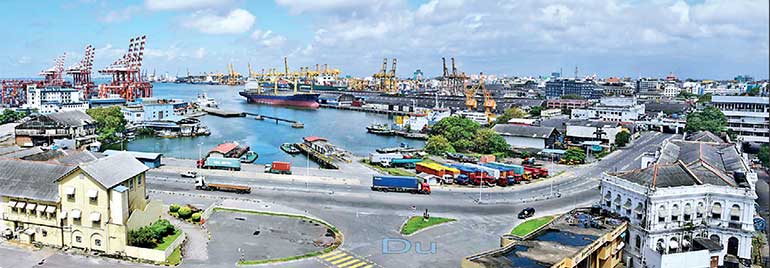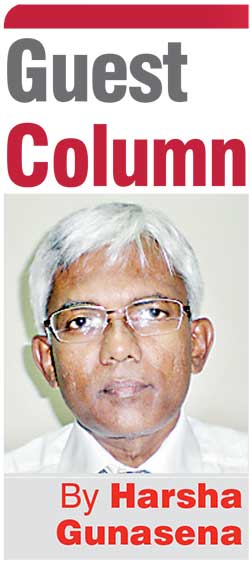Sunday Feb 22, 2026
Sunday Feb 22, 2026
Thursday, 27 October 2022 00:33 - - {{hitsCtrl.values.hits}}

 Sri Lanka had open economic policies since ancient times and it was a shipping hub in the Indian Ocean. The ships that sailed in the Indian Ocean between the West and the East have stopped at Sri Lanka. Plenty of seaports were located around the island. Sri Lanka was engaged in import and export businesses and in addition to that the island was a trade centre in the Indian Ocean and was engaged in entrepot trade.
Sri Lanka had open economic policies since ancient times and it was a shipping hub in the Indian Ocean. The ships that sailed in the Indian Ocean between the West and the East have stopped at Sri Lanka. Plenty of seaports were located around the island. Sri Lanka was engaged in import and export businesses and in addition to that the island was a trade centre in the Indian Ocean and was engaged in entrepot trade.
Sri Lanka mainly exported pearls, gems, elephants, and spices and imported mainly horses, ceramics, perfumes, and textiles. Mahavamsa mentioned that Sena and Guttika who ruled Sri Lanka for 22 years in the 3rd Century BC were the sons of a Tamil horse trader. In the 3rd Century BC, Megasthenes, the Greek ambassador in Pataliputra at the time of Maurya rule in India mentioned that wooden ships were built to transport elephants from Sri Lanka to Kalinga in India. In the 9th century Chinese scholar LI Zhao wrote that the vessels from Sri Lanka were the largest of those visiting Guangzhou, a port in China, with stairways for loading and unloading.
During those days the ships sailing from Persian ports to Guangzhou in China and vice versa could take up a long time and therefore it made sense to have a transshipment port in between. It is possible that port of Godavaya situated between present Hambantota and Ambalantota fulfilled this need for centuries. In a rock script at Godavaya it was mentioned that the king Gajabahu I in the 1st Century AD ordered that the customs duties of the seaport Gota Pabbata should be donated to a Buddhist temple situated close by.
The Greek writer Cosmas mentioned that in the 6th Century AD the goods from Sindu, Male, Kalliana and other ports in India as well as from China, Persia, Adule and Ethiopia were brought to Sri Lanka and then redistributed. This was entrepot trading.
In the 12th Century AD Parakramabahu the Great established a Tamil slab inscription in Nainativu (present Kayts) to the effect that the foreigners who disembark from their ships at the port Uratturai will remain under the security of the state. It further stated that the ships suffer wreckage in transit through the waters of the port will be charged based on the type of cargo. Wrecked vessels which carried elephants and horses will be charged a fourth share of the cargo but the vessels carried ordinary merchandise will have to pay a half share to the state treasury. One of the main reasons that Parakramabahu the Great invaded Burma was a dispute in Sri Lankan trading vessels.
The chronicles did not give emphasis to the commercial activities of the country so that we have to rely on various other sources in examining this aspect.
Later the kings of the Kandyan period adopted an open policy in foreign relations. Vimaladharmasuriya I, the first king of the Kandyan era was fluent in Portuguese and his queen consort was Kusumasana Devi also known as Dona Catherina, a Roman Catholic. During the Kandyan period persons of various nationalities and religions lived together in harmony.
In early 20th Century Anagarika Dharmapala insisted the importance of upliftment of industries and trade in Sri Lanka. He said that the revenue of the Government should be utilised to the building of steamships, upliftment of agriculture and establishment of industries.
Sri Lanka which was a trading and shipping hub during the time of Sinhala kings is now moving away from that position due to the protectionist policies adopted by its rulers with the blessing of the public.
Sirimavo Bandaranaike nationalised the oil industry in 1962. At that time Singapore was emerging as a nation which became independent in 1965. Oil companies which were forced to leave Sri Lanka were welcomed by Singapore. They contributed to the development of Singapore seaport by establishing oil refineries there. Government introduced a law that the majority ownership of the shipping companies in Sri Lanka should be held by the Sri Lankans. As a result, foreign shipping companies do not come to Sri Lanka and they are represented by the agents here. Shipping agents are against changing this law to allow the shipping companies to come here due to their own business interests which is detrimental to the growth of the shipping industry in Sri Lanka. As a result, global shipping companies supported the ports of Dubai in the Middle East and the port of Singapore in the Far East.
I have heard from a reliable source that a Head of State was bribed by a Chairman of a large conglomerate which was having a logistics sector with a number of shipping agencies, in order to prevent the liberalisation allowing majority foreign ownership of shipping companies.
In the year 2020 Singapore Port handled 36.6 million TEUs and Jebel Ali port which is the largest port in Dubai handled 13.5 million TEUs. Colombo port which is in the middle of the Indian Ocean handled only 6.85 million TEUs.
Two terminals of the Colombo Port were privatised, and the Port was expanded. This action facilitated the re-export of the goods coming from the Indian ports which were away from the main sea route. The position of the trade centre of the Indian Ocean enjoyed by Sri Lanka in the history was degraded to a mere transshipment port of Indian goods. We are benefitted by the growth of the Indian economy.
Irrespective of this background which is the dependency of Indian cargo by the Colombo Port, the attempt of the Gotabaya Rajapaksa government to privatise the East Container Terminal (ECT) with 49% ownership to Indian Adani Group was foiled due to the pressure of the trade unions which was the visible reason. There could be invisible reasons as well. However, the West Container Terminal (WCT) which was situated a bit away was given to the same Indian company with 85% stake. From the national point of view this was an idiotic action. In case the ECT was privatised the work would have been over by now. Since the Government does not have money, Port Authority did not do any development there. The reason for the behaviour of the trade unions of Colombo Port was to secure their jobs to which much effort was not given.
The politicians of the country are not in favour of privatisation of the lossmaking or inefficient government business entities since they want to fill those entities with their henchmen who support their elections, from top to bottom. This helps them to be in power.
As explained, the shipping agents, the trade unions and the politicians of this country are traitors to the nation. This traitorous act is perceived by the people of the country as a patriotic act since they are blinded with protectionism.
This myth which is against the Foreign Direct Investment (FDI) was promoted by the Sri Lankan governments especially by the Bandaranaike governments which initiated nationalisation of private entities and by the false adaptation of the Marxist thinking in the country. China which is ruled by a communist party achieved such a growth within few decades and uplifted the status of millions of the poor due to opening the country to FDIs and privatisation of the government entities.
Sri Lanka, which is a democratic country, cannot do what China has done without the consent of the people. Until such time the people do away with this backward thinking of protectionism the shipping agents, the trade unions and the politicians will continue in the path they have hitherto taken. This is how Sri Lanka lost its heritage as a shipping hub in the Indian Ocean.